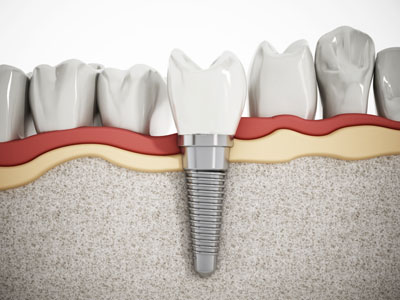Dental Implants: Stability to Depend On
 Dental implants are the most stable way to get a replacement for a natural tooth that has fallen out. Over the course of time, people tend to lose teeth from old age, disease or an accident. When this happens, a person is left with a gaping hole in their mouth. For many years, the only option that people had to get a replacement tooth was either dentures or a bridge.
Dental implants are the most stable way to get a replacement for a natural tooth that has fallen out. Over the course of time, people tend to lose teeth from old age, disease or an accident. When this happens, a person is left with a gaping hole in their mouth. For many years, the only option that people had to get a replacement tooth was either dentures or a bridge.
Thanks to dental surgery, implants are now the best way for somebody to replace a lost tooth. One of the most critical reasons why implants are such a good alternative to replace a lost tooth is that we surgically place them into the jawbone. This way, the implants do not fall out and have a unique relationship with the physical structure of the jaw.
Stability
The major problem with devices like dentures is that they lack the fundamental stability offered by a naturally occurring tooth. The reason why other prosthetic devices are unable to provide the level of stability that a natural tooth is is because prosthetic devices typically sit on the top of the gums. We secure the implants with the help of wires or other substances. However, in the case of dental implants, which are surgically placed by a dental surgeon, they are actually inserted into the jawbone itself which makes them as stable as a natural tooth.
The patient never has to worry about what they eat, the risk of losing a tooth while they are talking or having to remember to place the device back in after taking it out. The stability that implants offer is one of the major reasons why they are the fastest-growing dental prosthetic chosen by dental patients everywhere.
The implant itself
What makes dental implants such an effective tool is the implant itself. Many people, upon hearing about implants, incorrectly assume that the tooth surface they will be able to see after an implant surgery is a dental implant itself. This is not the case. The visible portion of the tooth in an implant process is actually the dental crown and is typically placed by the dentist.
However, deep underneath the surface, beneath the gum line is the dental implant. The dental implant is a tiny screw, consisting of titanium, that we place into the jawbone and then attach to the crown of the tooth with an abutment. For this type of dental implant, we need to place it surgically.
Call for information
The best way to get detailed information about dental implants, how they work in conjunction with the jaw, how they attach to the dental crown and other such questions is to schedule an appointment and come in with specific questions. All patients are evaluated for the viability of getting implants.
Recent Posts
The jawbone is the part of the face that holds many essential elements together, such as the teeth, ligaments, and muscles; however, bone grafting may sometimes be necessary if the jawbone is too weak to perform these tasks. A person’s jawbone can deteriorate over time, whether due to age, genetics, poor oral health, cancer, or…
Finding lasting relief from issues such as misalignment and facial asymmetry can involve specialized procedures. Fortunately, corrective jaw surgery is a reliable option for addressing these concerns. A dental specialist realigns the upper or lower jaw during this process to promote better function and comfort. Although the procedure can benefit health and appearance significantly, a…
Many individuals seek rhinoplasty to enhance facial harmony, improve nasal function, or correct structural abnormalities. As a surgical procedure that reshapes the nose, rhinoplasty can address aesthetic concerns as well as breathing difficulties caused by structural defects such as a deviated septum. Understanding the consultation process, surgical techniques, and what to expect from the recovery…
The facelift is one of the oldest and most well-known cosmetic surgeries for restoring a youthful appearance to the face. If you are considering this procedure, it is important to understand the steps of the process and the time commitment involved. The specifics of the process can vary depending on the patient; however, here is…


